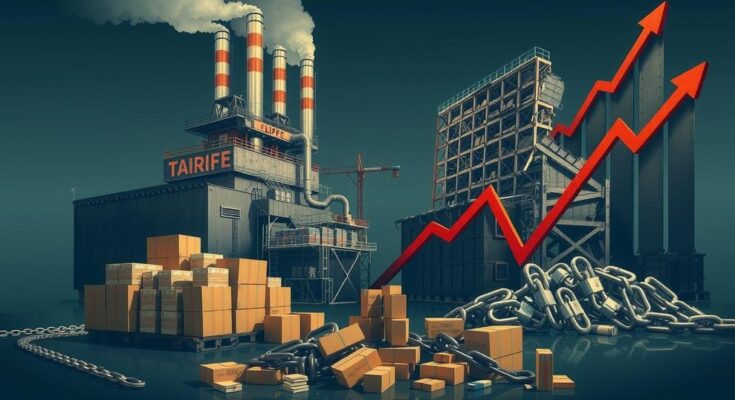Donald Trump’s tariff proposals aim to replace lost revenue from tax cuts and protect U.S. businesses, but they carry severe risks of corruption and economic decline. The unchecked power to impose tariffs could be exploited for personal gain, similar to tactics used by authoritarian leaders. Past experiences and global reactions suggest that such tariffs could lead to retaliatory measures and damage to the U.S. economy, emphasizing the need for caution against reverting to outdated trade policies.
Donald Trump promotes tariffs as a means to recover revenue from tax cuts and protect American industries. However, a closer examination shows tariffs can lead to widespread corruption and economic harm. While certain defensive tariffs may be justified, Trump employs a broader and uncontrollable tariff strategy which poses significant risks. With Congress largely surrendering its tariff oversight in 1962, Trump has the leeway to impose tariffs with limited checks and balances. This power can pave the way for corruption, as Trump has previously used tariffs to reward allies and target foes. Notable instances include granting exemptions to companies linked to his administration, notably one with ties to Russian leadership. Using tariffs as political tools mirrors tactics employed by autocratic leaders like Putin and Xi Jinping, who utilize trade policies to maintain power. There’s a growing concern that industry leaders may seek to curry favor with Trump for similar corrupt favors. The Supreme Court’s hesitance to curtail presidential tariff powers means Trump could misuse this authority for personal gain, damaging fair governance principles. The economic fallout from tariffs is also alarming. Trump’s plan for a universal baseline tariff would result in increased costs for consumers and businesses, diminishing choices and efficiency in the market. Historical context shows that the Smoot-Hawley Tariff exacerbated the Great Depression, hinting that similar repercussions could loom with Trump’s tariff proposals. The global backlash against past tariffs demonstrates the potential hazards of a trade war. Trump’s steel and aluminum tariffs prompted retaliations from other nations, harming significant U.S. industries like agriculture, and costing American consumers billions. Efforts to subsidize affected farmers underscore the initial policy’s failures, while proposed tariffs could evoke further hostile international responses. Trump’s intentions to fund tax cuts through tariffs face a stark reality. Trade wars historically prove unsustainable, leading to economic chaos and potential dollar depreciation, which undermines U.S. financial stability. As international competitors like BRICS nations vie to elevate their currencies, Trump’s tariff strategy may threaten the very foundations of American economic dominance. Ultimately, Trump’s approach to tariffs resembles a reckless gamble with economic stability. Such a policy would serve only to enrich Trump and his close associates while deepening the divide between the elite and the general populace. America must resist a return to protectionism and cronyism, advocating for policies that ensure fairness and competitiveness in trade instead of succumbing to Trump’s detrimental tariff ambitions.
The discussion surrounding tariffs underscores the balance between protecting domestic industries and fostering fair trade practices. Tariffs can serve beneficial roles but often lead to unintended consequences, especially when wielded by those with unchecked power. Historical context sheds light on the cyclical nature of tariffs and their impact on both the domestic economy and international relations, emphasizing the need for careful scrutiny of such policies.
In summary, Trump’s proposed tariffs represent not just a policy choice but a potential pathway to economic chaos and corruption. Overarching tariffs threaten consumer welfare and could instigate retaliatory economic actions worldwide, undermining American industry and the dollar’s global standing. As the nation reflects on its trade approach, it’s crucial to prioritize equitable and principled practices over short-sighted protectionism driven by personal interests.
Original Source: lasvegassun.com



